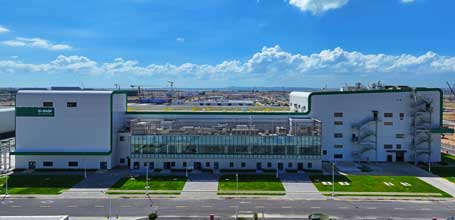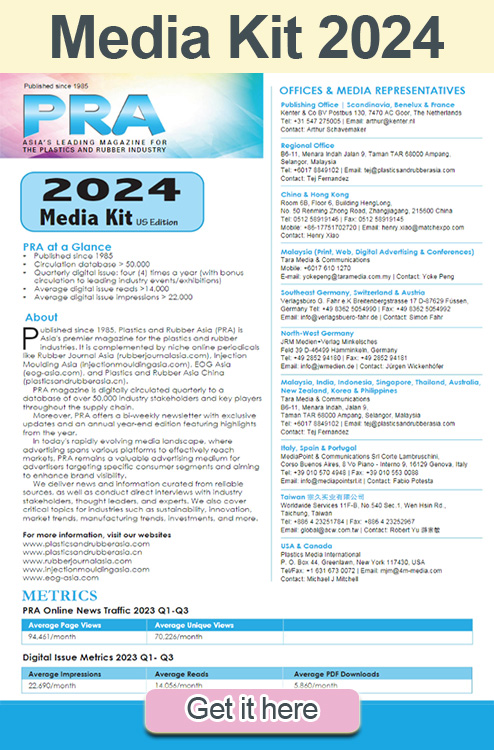China Expansions: BASF inaugurates TPU plant in Zhanjiang; Sabic finalises decision for US$6 bn Fujian petchem complex

German chemical firm BASF recently celebrated the inauguration of its Thermoplastic Polyurethane (TPU) plant at the Zhanjiang Verbund site. The new plant is the largest single TPU production line for BASF globally. The smart factory is built with advanced technologies – including automated guided vehicles and advanced automation systems – that translate into efficiency improvements, it adds.
BASF plans to power the entire Zhanjiang site with 100% renewable energy by 2025. The new site will be BASF’s largest investment to date with around EUR10 billion upon completion. It will be operated under the sole responsibility of BASF and will be the company’s third-largest site worldwide, following Ludwigshafen, Germany, and Antwerp, Belgium.
“The plant will enable BASF to meet the growing market demand for TPU in Asia Pacific – particularly in the Industrial, eMobility and new energy segments, as well as to be closer to key customer industries in China and Asia Pacific,” said Martin Jung, President, Performance Materials, BASF. “With this plant, we strengthen the supply of innovative and recyclable Elastollan TPU solutions in Asia and continue our Plastics Journey towards a more sustainable future.”
Along with the Zhanjiang site’s first plant inaugurated in 2022 producing Engineering Plastics compounds, as well as innovation Creation Centres and an R&D network in Asia Pacific, BASF adds it is well-positioned to meet the growing demand of its customers across the region for innovative material solutions. BASF’s R&D network provides engineering, simulation, and manufacturing know-how to help drive innovation and product development in tandem with market demand and trends such as the electrification of cars and miniaturization of electronic devices.
“BASF’s strategy is to produce where our customers are. Thanks to the strong support from the Chinese government, our employees, and partners, the Zhanjiang Verbund site project has been progressing steadily as planned and has now well concluded the construction of its initial phase,” said Haryono Lim, President, Mega Projects Asia, BASF. “The site is now focusing on building its core of the Verbund including a steam cracker and several downstream plants to produce petrochemicals and intermediates, among others. BASF is dedicated to building the Zhanjiang Verbund site as a role model of sustainable and smart production.”
“As the largest chemical market in the world, China plays a vital and strategic role for BASF. This milestone in the Zhanjiang Verbund site project highlights BASF’s robust development in China and our dedication to being close to our local customers,” said Dr. Jeffrey Lou, President and Chairman of BASF Greater China. “With the increased local production capabilities and strong commitments in sustainability, we can provide more innovative solutions with lower carbon footprints to our customers in China.”
Elastollan TPU is widely used in various industries, including automotive, consumer electronics, footwear, sports and leisure, healthcare, and industrial cables & wires. In the eMobility segment, the TPU provides flexibility and long-term durability in cable sheaths.
The growth of the TPU market, in particular for high-end applications, is driven by several factors including increasing regulatory requirements and growing customer expectations for enhanced sustainability performance.

Meanwhile in other news, chemical firm Sabic has announced the final investment decision (FID) for the Sabic Fujian Petrochemical Complex (Sino-Saudi Gulei ethylene complex project) in China’s Fujian province.
Sabic Fujian Petrochemicals Co, a 51:49 joint venture between Sabic Industrial Investment Company (wholly owned by Sabic) and Fujian Fuhua Gulei Petrochemical Co (holding by Fujian Energy and Petrochemical Group) decided to build the complex in Fujian’s Gulei Industrial Park.
With an estimated total investment of US$6.4 billion, it is another centrepiece of Sabic’s investment footprint in China and by far the largest foreign investment in Fujian.
The complex will consist of a mixed feed steam cracker, with an expected annual ethylene capacity up to 1.8 million tonness, with a series of world-class downstream facilities, including ethylene glycol (EG), polyethylene (PE), polypropylene (PP), polycarbonate (PC), and several other units. The construction of the project targets to complete in 2026.
The construction and subsequent operation of the project is using nine of Sabic’s technologies to meet its customers and markets evolving demand for high-end chemical products for applications in electrical and electronics, artificial intelligence, smartphones, telecommunications, healthcare, automobile and advanced materials, adds the firm.
The FID marks the second key milestone related to SABIC’s joint ventures in recent years, following the start of commercial operation for a new polycarbonate plant at the Sinopec Sabic Tianjin Petrochemical Co. Ltd. (SSTPC) joint venture in 2023.
Abdulrahman Al-Fageeh, Sabic CEO said: “The FID is a significant milestone for Sabic’s business expansion and development in China. The project aims to support our goal of diversifying our feedstock sources and establishing a petrochemical manufacturing presence in Asia for a wide range of products, and the FID decision fully reflects Sabic’s commitment to provide solutions to our customers and maximise shareholders value. Building on this, we will continue to capitalise on our partnerships to expand our footprint and continue to contribute to the targets of Saudi’s Vision 2030.”
(IMA)Subscribe to Get the Latest Updates from IMA Please click here
©2024 Injection Moulding Asia. All rights reserved.















